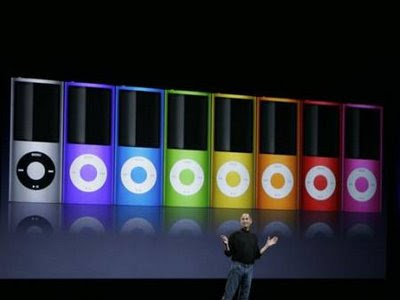 Apple Inc. CEO Steve Jobs took the wraps off a revamped line of iPods on Tuesday and trumpeted a truce with NBC Universal that means the TV network will begin selling programs again on iTunes.
Apple Inc. CEO Steve Jobs took the wraps off a revamped line of iPods on Tuesday and trumpeted a truce with NBC Universal that means the TV network will begin selling programs again on iTunes.The iPod announcements were largely expected, and investors were less than energized, sending Apple's shares down $6.24, 4 percent, to close at $151.68.
The iPod upgrades Jobs revealed Tuesday in a theater in San Francisco include two slick new Nano models, oval-shaped devices that Jobs said are the thinnest iPods Apple has ever made. They are less than a quarter-inch thick.
A $149 version comes with 8 gigabytes of memory (enough for 2,000 songs); a 16-gigabyte version (which holds 4,000 songs) is $199.
The new models acknowledge the incredible appetite for iPods - Jobs said Apple has sold 160 million iPods since their introduction in 2001, making them the runaway leader among portable music players. But Apple has to work hard to differentiate them from the iPhone, Apple's cell phone/iPod/Internet device that threatens to cannibalize some of the demand for iPods.
Jobs also showed off three new versions of the iPod Touch, which is much like an iPhone except that doesn't make calls. An 8-gigabyte version of the new model will sell for $229; a 16-gigabyte Touch will be $299 and a 32 GB model will be $399.
Apple hopes the 32-gigabyte unit will appeal to people who download a lot of games and other programs, and wouldn't be able to store them all on an iPhone, which tops out at 16 gigabytes. Jobs said people have downloaded a "mind-blowing" 100 million applications for iPhones and iPod Touch devices since Apple began offering the programs online two months ago.
"We don't think of it as cannibalization," said Philip Schiller, Apple's senior vice president of product marketing. "As long as they want an Apple product, we're happy."
But Ross Rubin, an analyst with market researcher NPD Group, said Apple's focus on the Nano and its new features indicates otherwise. Among the new twists: A "shake to shuffle" feature that lets people mix up their iPod playlists by giving the device a hard, abrupt shake.
Jobs also showed off a new "genius" feature in iTunes and the iPod's onboard software. If a user clicks the genius button while listening to a song, the program automatically creates a new playlist of similar songs from the user's own library. The software determines similarity in part by analyzing which songs other people have together in their libraries.
In the deal with NBC, the television network is coming back to iTunes a year after pulling out in a dispute over the prices Apple charges for shows it sells on the online service. At that time, programming controlled by NBC Universal, a unit of General Electric Co., made up an estimated 40 percent of the video downloads on iTunes.
At the height of the spat, Apple said NBC had sought more than double the wholesale prices for its shows, which would have resulted in shows selling for $4.99 each. NBC disputed that, and said it wanted only to be able to sell programs at different prices.
But with its muscle in the market for digital downloads, Apple largely appears to have won the battle. NBC's programming will sell for the same prices as other TV shows available on iTunes. High-definition shows, a new addition for iTunes, will sell for $2.99 each. Shows in standard definition cost $1.99. Some older shows are available for 99 cents apiece.
NBC was able to wring some concessions. Jean-Briac Perrette, NBC Universal's president for digital distribution, said NBC will be allowed to bundle programs together and set prices for those packages as well as for full seasons of shows. Apple wasn't willing to budge on those requests in earlier negotiations.
Perrette said NBC is "thrilled to be back on iTunes" but noted the network also has "a lot of other avenues" to sell shows online, including its own site and a video Web site, Hulu.com, that it created with News Corp.
Jobs gave the start of the event some buzz by flashing a message on a screen behind him: "The reports of my death are greatly exaggerated."
Jobs borrowed that line from Mark Twain in reference to obituary preparedness on Jobs that was accidentally posted by Bloomberg News and then retracted. News outlets regularly prepare obituary material on famous people.
Questions about Jobs' health swirled after he appeared gaunt at a recent Apple event. Apple has since said Jobs, 53, a survivor of pancreatic cancer, suffered from a bug and is better. He appeared thin but energetic Tuesday.
Comments